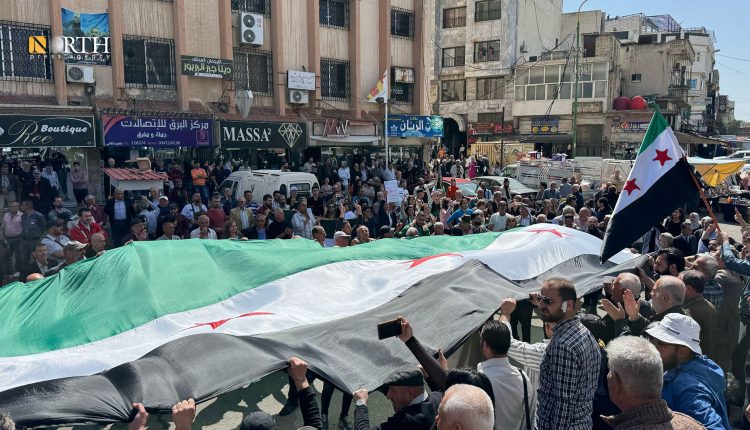Tensions in Syria’s Sweida as Journalists Attacked During Syrian Uprising Commemoration
By Kardo Roj
SWEIDA, Syria (North Press) – Local sources reported on Tuesday that journalists covering an event marking the 15th anniversary of the Syrian uprising in Sweida were assaulted by members of the local Military Council. The incident occurred in Karama Square, the central gathering point for protests in the city.
Eyewitnesses told North Press that armed elements affiliated with the council attempted to prevent journalists from documenting the event, redirecting coverage to align with their own narrative. “They sought to impose their version of events and suppress independent reporting,” a local source said, requesting anonymity for security reasons.
This is not the first time tensions have erupted between the Military Council and protesters in Sweida. Just days earlier, clashes broke out in Karama Square when demonstrators refused to allow the council’s flag to be raised during a gathering, leading to a brief but intense confrontation.
Sweida, a predominantly Druze city in southern Syria, has seen periodic unrest over the years. While largely avoiding the full-scale conflict seen in other parts of the country, the region has become a center of civil dissent, with protests frequently targeting the policies of the Syrian government. At the same time, armed factions have sought to exert influence over public demonstrations, occasionally clashing with protesters and journalists alike.
The attack on journalists in Sweida highlights the growing risks faced by media professionals operating in Syria. Press freedom groups have repeatedly warned of the increasing dangers for reporters covering sensitive political and social issues, particularly in areas where armed groups wield local power.
Activists in Sweida condemned the attack, calling for accountability and respect for media freedoms. “Journalists must be allowed to do their job without fear of violence or censorship,” one activist told North Press.
The latest incident underscores the volatility of Sweida’s political landscape. As public discontent continues to simmer, competing factions vie for control over the narrative, often at the expense of independent reporting. Observers warn that further clashes could occur if grievances remain unaddressed.
With tensions running high, the coming weeks will be crucial in determining whether the city can maintain its tradition of civic activism or whether growing pressure from armed elements will curb freedoms further.

